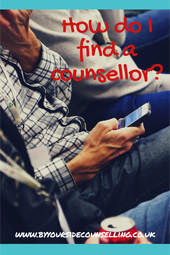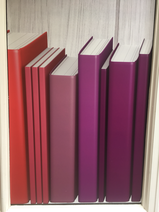 "How do I find a counsellor?" This is a question I am often asked. How do we as counsellors enable our clients to find out about us and what we offer? There have been numerous occasions when I have been asked how to find a counsellor. I guess as it's my field of expertise it's only natural that people feel able to ask. However, I and others in a similar position assume that everyone knows how to find someone. I'm wrong. Just because we in the profession have heard of the BACP, NCS, 'Counselling Directory', 'It's good to talk' website and countless other sites that we easily call to mind, doesn't mean that everyone else has, especially individuals who may be at crisis point; however these sites can often be a good place for them to start. Deciding that you think you might need to see a counsellor, telling someone you need help or admitting that you are currently struggling is a huge step for many people. There is still, despite the improved image, increased publicity and Royal support, a stigma associated with mental health. There is confusion between the terms counsellor, therapist, psychotherapist, psychiatrist and other titles that even those of us within the profession can struggle to separate or understand the different roles, training criteria and specifics offered. Throw into the mix the different modalities and wow, it can feel like we're wading through treacle, so imagine how prospective clients must feel?! How do we enable vulnerable individuals to find a counsellor and help them make that choice? There is no easy, clear answer. Whilst some of the issues stated above need addressing by the umbrella of mental health and possibly our professional bodies, we as individual counsellors can ensure our adverts (these can include leaflets, which can often be overlooked due to the easy use of the internet) and websites are understandable, user friendly and as far as possible jargon free. Before I undertook my counselling training I had no idea about Person Centred Theory, Gestalt, Jungian Theory, CBT, core conditions etc, etc. Clients who feel vulnerable need to know you are there for them. Not to offer a quick fix, but someone who will support them during difficulties in their lives, understand and empower them. We need to be transparent and provide links to further information and other agencies who could be better placed to support the individual at that time. As someone who works in private practice my initial thoughts were, “I can work with anyone.” There was also an element of ,"I need to work with anyone and everyone!" Whilst I acknowledge that, “yes I can” I have come to the realisation that although I can work with most individuals and their issues, I might not be the best person for the individual. I cannot be all things for all clients. I have my areas of expertise (although I am not the expert; I believe the client is the best expert of themselves) and realise that by acknowledging this, and as a consequence promoting myself in my own niche, will help the client in crisis identify which counsellor can support them best at this time. My SEO (search engine optimiser) reflects these key phrases, I provide links from my website to the BACP and other directories where I promote my services, this enables the client to make an informed decision as to whether I am the right counsellor for them at this time. I also provide external links within my blogs for further reading or alternative agencies that could provide the support being sought. Ultimately it is the clients choice. Going back to my initial title, if I am ever asked “How do I find a counsellor?” I signpost individuals to the counselling directory or specific counselling organisations that specialise in the issue that requires support. I also suggest asking friends and family for recommendations, word of mouth promotion is possibly one of the most powerful forms of recognition for any individual counsellor. Networking with other counsellors, letting them know your speciality enables them to promote you and what you're good at, if we all did just a little bit of this perhaps accessing counselling for our clients wouldn't be such a mine field as it can currently appear to be.
0 Comments
 Choosing a counsellor can often feel like a daunting task. Once the decision has been made that the time has come to talk with someone it can often feel overwhelming choosing, where to begin? In simplistic terms it could be compared to reading a book. I personally have to be in the right place (frame of mind) to read a book. I am sometimes envious of individuals who are able to constantly read something, and even have one or two books on the go simultaneously- now that just blows my mind! Choosing what to read is making an informed decision and choice, as is choosing a counsellor. Some individuals go by recommendations from their friends or family, whilst others pro-actively search. Google can be a good place to start, as can counselling directories and websites that have all the counsellors within a search distance pop up... This can be overwhelming, which one to choose? As with choosing a book, we can be drawn in by the front cover or font, whilst the old adage is don't judge a book by it's cover, there is a lot that can be said for going on gut instinct, we are often drawn to something we see for a reason - we just need to be mindful of what or why this has awakened our senses. Next, we tend to read the blurb on the back of the book, if it grabs us and we understand what is written, we take the next step... Once again, the same can be said about choosing the right counsellor for you. What draws you to their picture? Do you connect with the text they have written? Do you understand it (there is no shame in not understanding it, as there are some who blind us with the big words, phrases and terminology; and miss the point that many individuals seeking a counsellor just want someone to listen and support them.) Finally, we might dip into the book and read a couple of pages. The majority of counsellors offer an introductory session (some are free, some are at a reduced cost, whilst others charge for a full session), the choice is yours. The introductory session allows both of you the opportunity to see if counselling is right for you, but more importantly can you connect with this specific counsellor. We don't always continue to read the book we've chosen, the same is true of counselling, it has to be right for you at this moment in time, and this is ok. Whilst this insight might seem simplistic to some, for others it can help to realise that choosing the right counsellor for you may take time and a couple of goes, but once you find the right one you are one step closer to finding the best you too. Good luck with your counselling journey, if you wish to contact me, please do using the link below. It might be the best choice you've made. |
AuthorI am a counsellor who wants to empower individuals to be the best version of themselves. Archives
October 2020
Categories
All
|

 RSS Feed
RSS Feed